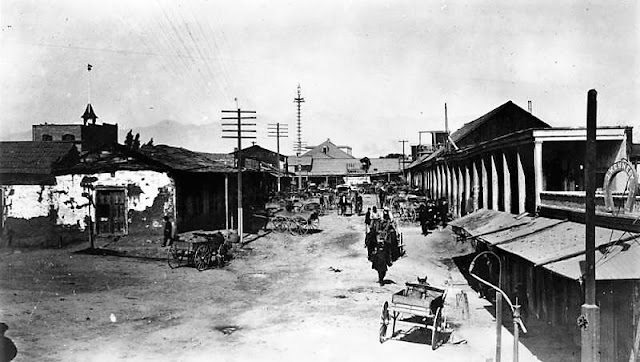Calle de los Negroes Los Angeles, CA 90012 | map - approximate |
Opening: Around 1841. The Sanchez adobe was on the west side of Calle de los Negroes, a block south of the Plaza. It later got absorbed, more or less, into an extension of N. Los Angeles St., now numbered as the 400 block.
The assumption is that the hall was built on or adjacent to Don Vincente Sanchez's adobe house. Either the house, or the hall (or both) were
reputed to be the only two story structures in town at the time. Some sources only give a location as "just south of the plaza" or
"on the eastern side of the square" or "near Los Angeles plaza."
The hall, along with Stearns Hall, was a major venue for parties, traveling shows and musical events. One writer in 1842 described the hall as being "painted
out in the most comical style with priests, bishops, saints, horses and
other animals -- the effect is really astonishing."
The new Mexican governor of California, a Sr. Michelotena,
took his oath of office in Sanchez Hall on December 31, 1842. Sanchez
St., between Main and Los Angeles, is named for Don Vicente.
Status: It evidently survived into the 1870s. The Garnier Building and the adjacent Sepulveda Building are now home to the Chinese American Museum at 425 N. Los Angeles St. They are, more or less, on the Sanchez site. The Garnier was constructed in 1890. It used to be bigger but the southern end was lopped off during construction of the 101.
This drawing of the buildings near the Plaza in 1853 has the Sanchez Adobe as #27 just off O'Campo Plaza, an area just south of the main Plaza. The
map appears on a page from the Jewish Museum of the American West.
Looking north toward the Plaza with Arcadia St. going off to the left.
The Coronel adobe, once the home of the Teatro Alarcon, is on the corner. The Sanchez adobe was on the left, half way up the block. It's a photo from the California
State Library that appears on the Los Angeles Public Library
website. They date it as c.1870. Their caption notes:
"On the left is
the adobe of Antonio Coronel; behind the adobe and with belltower is the
fire station; center with a gable roof is the adobe of Vincent Lugo
(facing the plaza on Los Angeles Street); and right with columns is the
Antonio Maria Lugo adobe, which he willed to his son, Dolores del Carmen
Lugo."
That's Main St. across the top. In this detail from plate
003 of the 1910 Baist Real Estate Survey from Historic Map Works they show the Garnier Block on the 400 block of Los Angeles St, also identified as "Negro Alley."
The Garnier Block originally, in its larger form, with addresses of 409-423 N. Los Angeles St. On the right, the Sepulveda Building entrance to the Chinese American Museum at 425. Photo: Bill Counter - 2019
More Information: On Google Books see page 67 of Volume 3 of the "Publications of the Historical Society of Southern California" for more about Sanchez.
See the Daily Mirror article "Calle de los Negros - a vanished landmark"
by Larry Harnish. Mark Hurlbut commented: "'Nigger Alley'...was named
for the dark-complected Indians who frequented its dens and cribs.
Harris Newmark, prominent businessman, wrote of his first night in L.A.
in 1853: 'Each side of Nigger Alley was occupied by saloons and gambling
houses….Those in charge of the (faro) banks were always provided with
pistols and were ready, if an emergency arose, to settle disputes on the
spot…..Human life at this period was about the cheapest thing in Los
Angeles. Nigger Alley was as tough a neighborhood as could be found
anywhere.'"
KCET also has an article on Calle de los Negros.
| back to top | Downtown: theatre district overview | Hill St. and farther west | Broadway theatres | Spring St. theatres | Main St. and farther east | downtown theatres by address | downtown theatres alphabetical list |
| Westside | Hollywood | Westwood and Brentwood | Along the Coast | [more] Los Angeles movie palaces | the main alphabetical list | theatre history resources | film and theatre tech resources | theatres in movies | LA Theatres on facebook | contact info | welcome and site navigation guide |
An exploration of historic Los Angeles theatres including the grand movie palaces, neighborhood cinemas, and legitimate playhouses. Browse thousands of photos from various archives.
Start your Los Angeles area historic theatre explorations by heading to one of these major sections: Downtown | North of Downtown + East L.A. | San Fernando Valley | Glendale | Pasadena | San Gabriel Valley, Pomona and Whittier | South, South Central and Southeast | Hollywood | Westside | Westwood and Brentwood | Along the Coast | Long Beach | [more] L.A. Movie Palaces | Site Navigation |
To see what's recently been added to the mix visit the Theatres in Movies site and the Los Angeles Theatres Facebook page. Questions? Contact us.




No comments:
Post a Comment